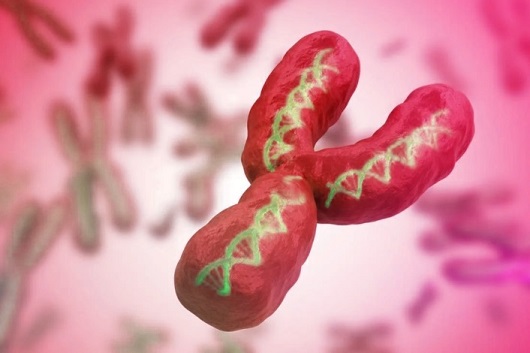Nikhil Prasad Fact checked by:Thailand Medical News Team Apr 16, 2025 4 hours, 12 minutes ago
Medical News: A new scientific study is shedding light on a mysterious aspect of the COVID-19 pandemic—why the virus hit certain regions and male populations harder than others. Researchers from Stavanger University Hospital and the University of Stavanger in Norway, along with experts from the Norwegian Institute of Public Health, University of Zaragoza and Universidad Complutense de Madrid in Spain, and the Western Norway University of Applied Sciences, suggest that genetic variants on the Y chromosome might play a critical role in shaping how the disease affects men around the world.
 Y Chromosome May Hold Clues to Why COVID-19 Hit Some Men and Countries Harder
Y Chromosome May Hold Clues to Why COVID-19 Hit Some Men and Countries Harder
From the earliest days of the pandemic, global data consistently showed that men were more likely than women to suffer severe illness and die from COVID-19. But what puzzled scientists even more was that some countries and regions experienced far higher male mortality rates than others, even after accounting for factors like age, healthcare access, and public health measures. This
Medical News report focuses on the latest research that proposes a bold hypothesis—that certain versions of the Y chromosome, which is passed from father to son, may affect how well the male immune system responds to COVID-19.
The Genetic Puzzle of the Y Chromosome
Unlike the X chromosome, which carries more than 1000 genes and influences a wide range of immune functions in both men and women, the Y chromosome is much smaller and was historically thought to play a limited role beyond determining male sex. However, recent studies have shown that this chromosome also carries a handful of genes that influence the immune system and inflammation in men.
The Norwegian and Spanish researchers decided to analyze Y chromosome haplogroups—clusters of genetic traits inherited through male lineage—and compare their global distribution with regional COVID-19 mortality patterns. What they found was both striking and concerning.
Y Haplogroups and Global Death Patterns
The researchers discovered that different populations across the globe have different dominant Y chromosome haplogroups, and these haplogroups appear to correlate with regional COVID-19 death waves. For example, the haplogroup R1b—which is common among men in Western Europe and parts of North and South America—was strongly associated with higher COVID-19 death rates during the first wave of the pandemic.
One of the hardest-hit regions, Bergamo in northern Italy, had more than 80 percent of its male population carrying this R1b variant. Similar patterns were observed in Spain, France, the United Kingdom, and parts of the Americas—regions where R1b is prevalent due to historical migration patterns dating back to the Bronze Age.
Other genetic clusters also seemed to align with later waves of the pandemic. The second wave, for instance, hit Eastern Europe and the Balkans particularly hard, areas where different haplogroups such as R1a and I2 dominate.
Meanwhile, countries in Southeast Asia and Africa, where other haplogroups like O and E are more common, reported comparatively lower COVID-19 mortality, although differences in age distribution and underreporting may play a role.
Historical Clues and Evolutionary Pressures
The study suggests that evolutionary history may have shaped how different populations respond to viral infections. The researchers note that some Y chromosome variants have previously been linked to worse outcomes in diseases like HIV and influenza. Their presence in certain populations could make men in those regions more vulnerable to new viruses like SARS-CoV-2.
Interestingly, many of the same regions that suffered high COVID-19 mortality in 2020 were also heavily impacted by historical pandemics and diseases brought during the Columbian Exchange and other migrations—raising the possibility that some populations may carry lingering genetic vulnerabilities.
A Call for More Research
The study authors emphasize that while these genetic patterns are compelling, more work is needed to understand the exact biological mechanisms at play. They urge large-scale genome studies to include the Y chromosome—often excluded from genetic analyses due to its complexity—and to examine how it might interact with other immune-related genes on the X chromosome and autosomes.
They also propose that future pandemic planning and personalized medicine approaches should consider the potential role of sex chromosomes and ancestry in determining disease risk and severity.
Final Thoughts
The conclusions of this study highlight a fascinating and underexplored piece of the COVID-19 puzzle. If further research confirms the link between Y chromosome variants and disease outcomes, this could transform our understanding of male vulnerability not only to COVID-19 but to other viral infections as well. It also underscores the importance of integrating genetic diversity and evolutionary history into global health strategies. Understanding how inherited traits shape our immune responses may be crucial in building more effective interventions for future pandemics. As researchers continue to map out the human genome’s influence on health, the once-overlooked Y chromosome may prove to be a vital clue in solving complex public health mysteries.
The study findings were published in the peer reviewed journal: Scandinavian Journal of Public Health
https://journals.sagepub.com/doi/full/10.1177/14034948251333236
For the latest COVID-19 News, keep on logging to Thailand
Medical News.
Read Also:
https://www.thailandmedical.news/news/covid-19-genetics-australian-led-study-indicates-that-east-asians-may-have-genetically-adapted-to-the-coronavirus-since-25,000-years-ago
https://www.thailandmedical.news/news/breaking-covid-19-genetics-yale-scientist-identify-eight-super-genetic-variants-in-white-people-that-increases-covid-19-death-risk
https://www.thailandmedical.news/news/duke-university-s-covid-19-genetics-and-phenotype-study-discovers-alternate-associations-with-sars-cov-2-risk-loci-
https://www.thailandmedical.news/articles/coronavirus
https://www.thailandmedical.news/pages/thailand_doctors_listings
